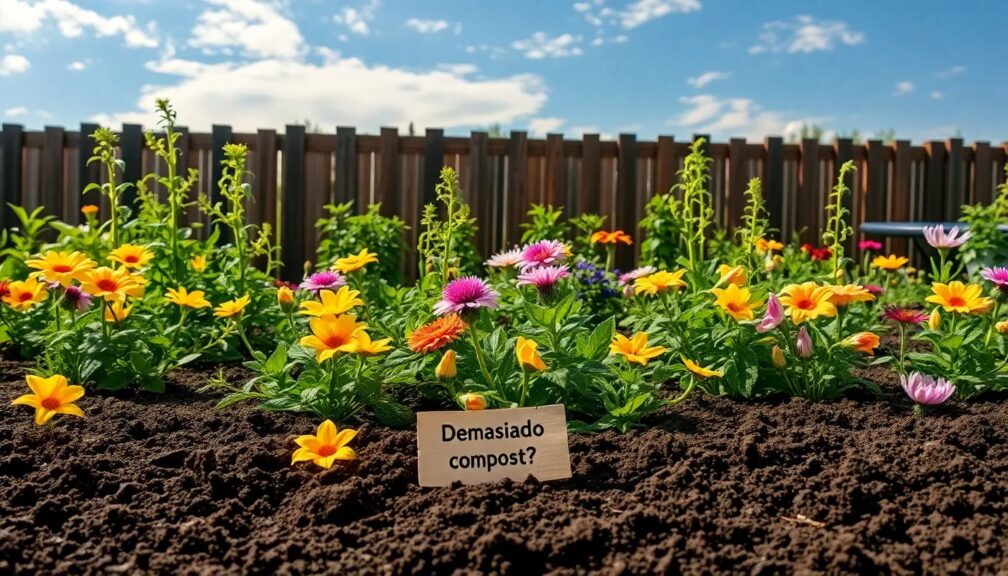Can you put too much compost in a garden

Welcome to our comprehensive guide on the use of compost in gardening. As avid gardeners seek to enrich their soil and promote healthy plant growth, the question arises: Can you put too much compost in a garden? While compost is undeniably beneficial for gardens, providing essential nutrients and improving soil structure, there is a delicate balance to be maintained. In this article, we will delve into the implications of excessive compost application, exploring how it can affect soil health, plant well-being, and overall garden ecology. Join us as we unpack the myths and facts surrounding compost usage, and learn the optimal ways to harness its power without tipping the scales.
Can you put too much compost in a garden reddit
Gardeners and green thumbs, have you ever wondered if there's such a thing as too much compost in your garden? The truth may surprise you, and leave you eager to adjust your gardening strategy for the better.
First off, let's address the elephant in the room: compost is often touted as the black gold of the gardening world. It's rich in nutrients, enhances soil structure, and is revered for its ability to support a thriving ecosystem underground. But here's the twist—more isn't always better.
Excessive compost, particularly that which is rich in nitrogen, can lead to nutrient imbalances and soil that's too dense. Imagine your plants trying to grow in a space where they're smothered rather than nurtured. That's the potential consequence of going overboard with compost.
Let's break it down:
1. Nitrogen Overload: Too much nitrogen can lead to rapid, lush growth at the expense of flowers and fruit. Your plants might look impressive, but their productivity could plummet.
2. Salt Accumulation: Over-composting can lead to a build-up of salts in the soil, which can harm plant roots and disrupt the soil's natural chemistry.
3. Pests and Diseases: An environment that's too rich can attract unwanted visitors such as pests and diseases. These opportunists thrive in the lush conditions created by excessive compost.
4. pH Imbalances: Compost can affect the pH level of your soil. While some compost can help neutralize pH levels, too much might tip the balance, making the soil either too acidic or too alkaline for your plants.
5. The Law of Diminishing Returns: After a certain point, the benefits of additional compost will lessen, and you might be wasting your time and resources without any added advantage for your plants.
Now, if you're sitting on the edge of your seat, worried that your garden might be at risk, don't fret. The key is balance. Understanding and applying the right amount of compost can transform your garden without the risk of going too far.
The secrets to perfect compost usage are hidden in plain sight, nestled within the shared experiences of countless garden enthusiasts. Unlocking these insights can be the difference between a garden that's merely surviving and one that's robustly thriving.
Ready to delve deeper and turn your garden into an envy-inducing oasis? The journey into the world of optimal composting is just beginning, and the next page holds the priceless nuggets of wisdom you're seeking. Don't let your garden become another cautionary tale of good intentions gone awry. Take the leap, and read on to secure your place as the sage of sustainable soil management.
Signs of too much compost in garden
Imagine stepping into your garden, expecting to be greeted by flourishing plants and vibrant flowers, only to find the opposite: signs of distress and poor health. It might come as a surprise, but the very substance you use to nourish your plants—compost—could be the culprit when used in excess.
The rich, organic matter that we so lovingly incorporate into our gardens has a dark side if not used judiciously. It's a case of too much of a good thing leading to potentially dire consequences. What if I told you that your overly generous application of compost could be silently stifling your garden's growth?
Here are the tell-tale indicators that you've crossed the line:
1. Stunted Plant Growth
When plants fail to reach their expected size or appear dwarfed, you might be witnessing the effects of nutrient imbalances caused by excessive compost.
2. Nitrogen Burn
Too much organic material can lead to a phenomenon called nitrogen burn, where the high levels of nitrogen in compost burn the plant roots, leading to yellowing leaves and stunted growth.
3. Soil Structure Deterioration
Healthy soil should be loose and crumbly, but an overabundance of compost can make it heavy and compacted, negatively impacting root development and water infiltration.
4. Water Logging
Over-saturated compost can hold too much moisture, leading to waterlogged conditions that suffocate roots and invite fungal diseases.
5. Pest Infestations
An excess of compost can also create a breeding ground for certain pests drawn to the overly rich environment.
The consequences of over-composting are far-reaching, impacting not just the health of your plants but the surrounding ecosystem as well. The key to avoiding these issues lies in understanding the balance necessary for a thriving garden.
Are you ready to delve deeper into the world of compost moderation? The secrets to unlocking the full potential of your garden without the pitfalls of overzealous composting are just a read away. Don't let your hard work go to waste—learn how to achieve the perfect garden harmony with just the right touch of compost. Your flourishing garden awaits!
How to fix too much compost in garden
Are you witnessing over-fertilized plants or stunted growth in your garden? It could be a sign that you've gone a bit overboard with the compost. But fear not, green thumbs and gardening novices alike, because the solution to this common problem is within reach, and the results might just transform your garden from lackluster to lush.
Firstly, the key to a healthy garden lies in balance. Excessive nutrient levels can lead to a host of issues, including soil imbalances and the disruption of beneficial microorganisms. But here's a snippet of wisdom—moderation might be well-known, yet often overlooked. To strike the right chord, you need to recognize the telltale signs of too much compost and act swiftly.
Imagine witnessing your garden bounce back, with plants that flourish and produce yields beyond your expectations. That's what tackling this issue can do! Begin by diluting the nutrient concentration. This might involve removing some of the compost-rich soil and replacing it with plain topsoil or even sand to improve drainage.
Don't overlook the power of plant rotation and varied planting. Some plants are voracious feeders and will gladly take up the excess nutrients, helping to restore equilibrium to your garden beds. Moreover, consider the magic of a good watering routine. Flushing the soil can help to leach out some of the excess nutrients.
The journey to remedying your garden doesn't end here. There are more secrets and methods to uncover that can revitalize your soil and ensure a bountiful harvest. The steps you take today can lead to a thriving garden tomorrow, and perhaps even the envy of your neighbors. Dive deeper into the art of compost balance, and watch as your garden transforms before your very eyes.
How to neutralize too much manure in garden
Are you staring at your garden, wondering if the lush days of vigorous plant growth have been stifled by an overzealous addition of manure? The fear of losing your precious greens to the burns of nutrient overload is real, but worry not; there are fail-safe strategies that can bring your garden back into the harmony of growth and vitality.
The first step in reclaiming your garden's equilibrium is understanding the power of composting. This age-old method isn't just about waste reduction— it’s your garden's lifeline in the face of excess manure. By incorporating brown materials such as dried leaves, straw, or even shredded paper, you can kickstart the process of balancing out the high nitrogen content that's likely causing the trouble.
But the magic doesn't stop there. Have you ever considered the wonders of dilution? It sounds simple, and it truly is! By watering your garden more frequently, you can help to dilute the concentration of nutrients, especially if the manure hasn't been fully broken down yet. It's a game of patience, but the results are well worth it.
Now, let's talk about plants that thrive on high nutrients. Certain green giants like zucchini and corn can be your garden's best friends in times of excess. They're nutrient hogs that will gladly take up the extra offerings of your over-fertilized soil. Planting these can turn a potential disaster into a bumper crop.
But what if you could turn this challenge into an opportunity for even greater biodiversity? Introducing cover crops such as clover and rye can help you fix the imbalance while also bringing a multitude of other benefits like soil erosion control and the attraction of beneficial insects.
The clock is ticking, and your garden's revival awaits. With these techniques up your sleeve, not only can you neutralize the excess manure, but you can also transform your garden into a more robust, resilient, and dynamic ecosystem. The journey to a balanced garden is filled with learning and growth—quite literally. Don't let the fear of too much manure rob you of the joy of gardening. Embrace the challenge, and watch as your garden thanks you with a bounty that's richer than ever before.
Can too much manure kill plants
It's a common misconception that more is always better, especially when it comes to fertilizing our gardens. However, the truth lurking within the soil tells a different tale. Overloading your plants with manure can lead to a catastrophic environment where your once thriving garden may face its untimely demise.
When it comes to using manure, precision is key. Too much of this organic matter can lead to nutrient imbalances, which at first might sound beneficial, but the reality is a complex and dangerous affair. For instance, nitrogen, an essential component for plant growth, is abundant in manure. Yet, when there's an excess, it can cause nitrogen burn, scorching your plants and effectively stifling their ability to flourish.
But the perils don't end there. Over-fertilizing with manure doesn't just harm the plants directly; it can upset the entire ecosystem beneath the surface. Soil microorganisms, crucial for decomposing organic matter and aiding nutrient absorption, can become overwhelmed. This disruption can lead to a soil environment unsuitable for healthy plant life.
The intrigue deepens when we consider how manure affects soil moisture levels. Too much organic matter can either lead to excessive moisture retention, which in turn can cause root rot, or it can block moisture from penetrating the soil, leading to dehydration. Both scenarios spell trouble for plants.
So, what's the secret to using manure effectively without crossing the line into the danger zone? The answer lies within a delicate balance and understanding the specific needs of your garden. Staying informed about the types of manure available, their nutrient content, and the appropriate application rates is critical.
But how do you strike that perfect balance? What signs should you look for to prevent over-fertilization? Unlock these mysteries and ensure the survival of your garden by delving further into the world of manure management. The life or death of your plants hinges on this knowledge—don't let the fate of your garden be left to chance.
Consejo final: While compost is beneficial for your garden, it is possible to have too much of a good thing. Excessive compost can lead to nutrient imbalances, overly rich soil, and potential harm to your plants. Aim for a balance, incorporating compost in moderation and testing your soil periodically to maintain optimal health for your garden.
Wishing you a thriving and verdant garden!
 How long after adding compost can you plant
How long after adding compost can you plant What happens if you don't mix your compost
What happens if you don't mix your compost Is it OK to mix potting soil with topsoil
Is it OK to mix potting soil with topsoil What's better compost or topsoil
What's better compost or topsoil Can you plant immediately after tilling
Can you plant immediately after tillingIf you want to know more about similar articles like Can you put too much compost in a garden you can visit category Gardening Tools.